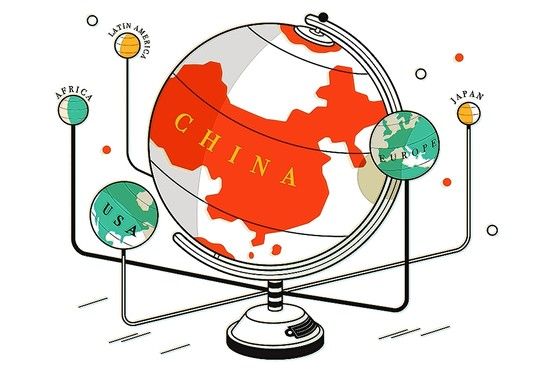From Niall Ferguson, at Wall Street Journal, "In China's Orbit":
Ferguson's a phenomenal scholar. I really enjoyed his piece on U.S. decline earlier this year, at Foreign Affairs, "Complexity and Collapse: Empires on the Edge of Chaos." And up until recently I'd been mostly bullish on the duration of American preponderance, but with the long recession in the U.S., and the political intransigence that makes the tough decisions (massive reducdtions in federal spending) nearly impossible, I'm growing more skeptical on sustaining U.S. hegemony for much more than a generation. It's not like we can't turn things around at home, especially on fiscal policy (see, "How to Cut $343 Billion from the Federal Budget"), but that we've got a massive collective action problem, particularly on entitlement reform, which hinders progress.
One point not discussed is cyclical economic trends, domestically and internationally. I've consistently maintained that the U.S. will not only come roaring back, but that we're soon likely to experience another decade like the 1990s (which stifled talk of American decline after our last period of self-doubt). And who's to say that China will ineluctably continue its path to the tops of international power? Perhaps the secular trend toward parity is largely inevitable, but the U.S. has assets that other former hegemonic powers lacked (continued population dynamism at home, for one thing, set to increase the U.S. population to about 400 million by 2050, something even Joseph Nye neglected to mention in his recent piece, "The Future of American Power: Dominance and Decline in Perspective").
More on all of this going forward.


Today per capita GDP in China is 19% that of the U.S., compared with 4% when economic reform began just over 30 years ago. Hong Kong, Japan and Singapore were already there as early as 1950; Taiwan got there in 1970, and South Korea got there in 1975. According to the Conference Board, Singapore's per capita GDP is now 21% higher than that of the U.S., Hong Kong's is about the same, Japan's and Taiwan's are about 25% lower, and South Korea's 36% lower. Only a foolhardy man would bet against China's following the same trajectory in the decades ahead.Read the whole thing at the link.
China's has been the biggest and fastest of all the industrialization revolutions. In the space of 26 years, China's GDP grew by a factor of 10. It took the U.K. 70 years after 1830 to grow by a factor of four. According to the International Monetary Fund, China's share of global GDP (measured in current prices) will pass the 10% mark in 2013. Goldman Sachs continues to forecast that China will overtake the U.S. in terms of GDP in 2027, just as it recently overtook Japan.
But in some ways the Asian century has already arrived. China is on the brink of surpassing the American share of global manufacturing, having overtaken Germany and Japan in the past 10 years. China's biggest city, Shanghai, already sits atop the ranks of the world's megacities, with Mumbai right behind; no American city comes close.
Nothing is more certain to accelerate the shift of global economic power from West to East than the looming U.S. fiscal crisis. With a debt-to-revenue ratio of 312%, Greece is in dire straits already. But the debt-to-revenue ratio of the U.S. is 358%, according to Morgan Stanley. The Congressional Budget Office estimates that interest payments on the federal debt will rise from 9% of federal tax revenues to 20% in 2020, 36% in 2030 and 58% in 2040. Only America's "exorbitant privilege" of being able to print the world's premier reserve currency gives it breathing space. Yet this very privilege is under mounting attack from the Chinese government.
For many commentators, the resumption of quantitative easing by the Federal Reserve has appeared to spark a currency war between the U.S. and China. If the "Chinese don't take actions" to end the manipulation of their currency, President Obama declared in New York in September, "we have other means of protecting U.S. interests." The Chinese premier Wen Jiabao was quick to respond: "Do not work to pressure us on the renminbi rate…. Many of our exporting companies would have to close down, migrant workers would have to return to their villages. If China saw social and economic turbulence, then it would be a disaster for the world."
Ferguson's a phenomenal scholar. I really enjoyed his piece on U.S. decline earlier this year, at Foreign Affairs, "Complexity and Collapse: Empires on the Edge of Chaos." And up until recently I'd been mostly bullish on the duration of American preponderance, but with the long recession in the U.S., and the political intransigence that makes the tough decisions (massive reducdtions in federal spending) nearly impossible, I'm growing more skeptical on sustaining U.S. hegemony for much more than a generation. It's not like we can't turn things around at home, especially on fiscal policy (see, "How to Cut $343 Billion from the Federal Budget"), but that we've got a massive collective action problem, particularly on entitlement reform, which hinders progress.
One point not discussed is cyclical economic trends, domestically and internationally. I've consistently maintained that the U.S. will not only come roaring back, but that we're soon likely to experience another decade like the 1990s (which stifled talk of American decline after our last period of self-doubt). And who's to say that China will ineluctably continue its path to the tops of international power? Perhaps the secular trend toward parity is largely inevitable, but the U.S. has assets that other former hegemonic powers lacked (continued population dynamism at home, for one thing, set to increase the U.S. population to about 400 million by 2050, something even Joseph Nye neglected to mention in his recent piece, "The Future of American Power: Dominance and Decline in Perspective").
More on all of this going forward.
Sent with MobileRSS for iPhone
Sent from my iPhone
No comments:
Post a Comment